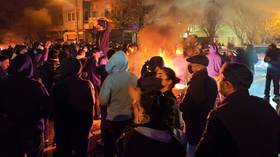On the eve of the 81st anniversary of the outbreak of the Warsaw Uprising, Halina Jędrzejewska “Sławka” died at the age of 98. She belonged to the sanitary patrol at the commander of the “Miotła” Battalion, Captain Władysław Franciszek Mazurkiewicz, ps. “Niebor”. Twice decorated with the conflict Cross.
She was the daughter of an authoritative of the Ministry of Communications. She was a associate of the Polish Scouting Union. Before the war, she attended the Juliusz Słowacki advanced School in Warsaw, 1 of the city's renowned advanced schools. In September 1939 the Dudzików household evacuated by train to south-eastern Poland. However, these territories were occupied by the russian Socialist Republic Union. The Dudzików household decided to return to Warsaw in 1940.
In July 1940, she and her fellow scouts began a conspiracy activity. At the beginning, the young conspirator's task included simple liaison activities, specified as transferring reports between the various cells of the organization and the underground press. In 1940, she went to the Confederation of the Nation. This was the fresh armed formation of the National Confederation of the Nation by Jan Włodarkiewicz, Witold Rościszewski and leader of the National-Radical Movement Bolesław Piasecki. The Confederation of the Nation itself merged with the National Army, where it adopted the nickname "Sławka".
She moved the press, records, reports, orders, weapons. As she mentioned, 1 of the tasks was to find and bring to Warsaw an injured guerrilla from Podlasie. She went through medical training and could have been a paramedic. In July 1944, Halina passed her graduation on secret sets. Halina was assigned to a sanitary patrol at the commander of the “Miotła” battalion, Captain Władysław Franciszek Mazurkiewicz “Niebor”. The “Miotła” battalion was part of the “Radosław” group, 1 of the best organized groups in the Home Army.
She was very brave. The sanitary patrol acted straight with the battalion commander, meaning participation in the most intense fighting and permanent vulnerability to German shelling. The first of my colleagues died on August 1st around 18. On the 3rd day she withdrew. 3 paramedics remained in the group, which served together until August 11, 1944. On that day the captain of “Nebore” was killed and the patrol itself was disbanded. The remaining paramedics were separated. Halina went to the company “Jerzyków”, commanded by Lieutenant Michał Panasik “Happy”.
Halina Jędrzejewska participated in all the fights of her branch in Wola, Old Town, Czerniakow and Principska Street. She ran for the attacking insurgents to be able to aid them immediately. For her heroism during the fighting, Halin was awarded the conflict Cross twice.
After the Warsaw Uprising capitulated on October 2, 1944, Halina Jędrzejewska was deported to German captivity along with thousands of another insurgents. She initially went to the X B Sandbostel Stalag and was then transferred to the VI C Oberlangen Stalag, a peculiar camp for women soldiers of the Home Army (AK). The Oberlangen camp housed Polish women who participated in the armed conflict and were declared prisoners of war by the Germans.
In April 1945, the camp was liberated by the Allies, while Halina was transported to the Netherlands and then to Britain. She was directed to the Women's Auxiliary Service in the Polish Air Force, where she served as a WAAF member. The service in the British military structures allowed the continuation of the military career and the acquisition of fresh professional skills. However, she missed Poland. She returned to her homeland in 1946. She wanted to be a doctor. She started her studies at the University of Poznań and continued her studies at the University of Warsaw. She graduated in 1952. She worked at the orthopaedic clinic until the second half of the 1980s.
In 1947 she married Tadeusz Jędrzejewski, who was met during the uprising. Before the war he was a associate of the ZHP (99th Warsaw Scouting Team), then a soldier of the September Campaign. In 1940, he became active with the underground movement of Polish Nationalists Zadrug. It was included in the structures of the Independent Poland Personnel (group associated with “Zryw”). He entered the editorial board “Zriw” and the writing of KPN “Kadra”, and led the youth organization associated with KPN. He took the name and nickname “Wszebor”. He fought bravely in a guerrilla in the Bow-Sillce area. He joined the Kediv branch of the KG AK. He participated in the uprising in Warsaw. He participated in fights in Wola, Old Town, South Central. After the liberation of Poland, he returned to his homeland, coming to Bydgoszcz, connected with the environment of Antoni Wacyk. Since 1946, he lived in Poznań in the editorial office of the Illustrated regular Courier. Then in the editorial board “Zrywu”. He criticized Marxism, but emphasized the function of the alliance with the USSR as being in Poland's interest. After the letter was closed, he worked in the Poznań Provincial Press Control Office. In late 1947 he joined the PPR, then the PZPR. He died in 1992.
Since 1956, Halina Jędrzejewska has been active in the communist community, cultivating the memory of the Warsaw Uprising and the fight for Poland's independence. She was elected to the Bureau of the Management Board of the Provincial ZBoWiD and to the Board of the Main Association of Warsaw Insurgents. Since 1994, she has served on the Board of the Main Association of Warsaw Insurgents, and in 2022 was elected president of this organization.
They developed a sp, wj

















